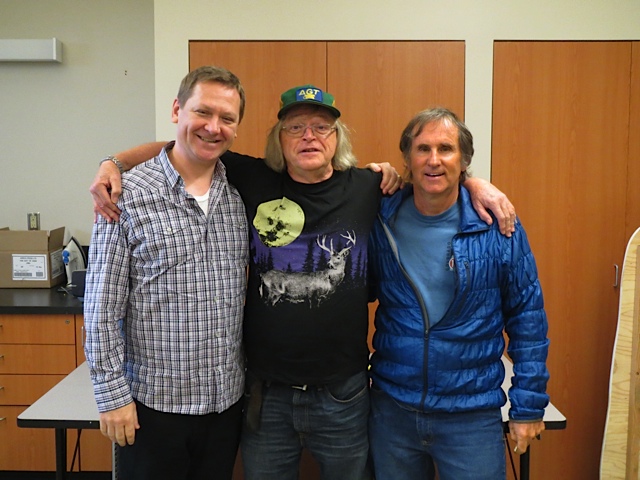Print Edition: October 2, 2013

This past weekend, bill bissett performed to an intimate group at the The Reach in Abbotsford. The first thing you need to know about bill: he is strongly unique. It’s evident even in the way he writes his name – using proper grammar and capitalization is not how bill goes about things. He makes his own rules and communicates in his own way. He’s not ‘Bill Bissett,’ he is bill bissett. For bisset, there is no proper noun. He doesn’t rank things that way.
Both UFV political science professor Ron Dart and English professor Carl Peters were in the audience. Peters has written a book on bissett’s work. In turn, Dart is working on a collection of essays about another Canadian poet, Milton Acorn. Acorn is the better-known writer, winning the Governor General’s Award in 1976 for his book The Island Means Minago.
“While in Vancouver during the ‘60s, bissett and Milton worked on a book together. Somehow the manuscript has been lost. The hunt has begun to find it – bill doesn’t have a copy and Milton died in 1986,” Dart said.
Both poets have been highly influential on the political literature of Canada.
“One of the themes in my work deals with letting hierarchies in society dissolve. I want to discuss how we are equal. Another main theme in my work is the search for true love,” bissett explained.
His performance reminds us that Vancouver, where bissett thrived as a poet, was once known as the center of Canadian counter-culture, as opposed to the images of condos and corporate-named stadiums we associate the city with today.
What made bissett’s performance relevant was his purely Canadian style, aesthetic, and vibe. If you’re new to his work like I was, don’t bother looking him up on YouTube. He comes off as bad comedy-poetics via a computer screen – bissett needs to be experienced live or read from the pages of a book to be understood. Lines like “The grave inside you,” “Trembling cellulose, bang bang, you’re alive,” and “Under the difficult subway” only work when bisset is in the same room as you are. His delivery is dynamic, gentle, and wacky. It’s impossible to tell when bissett’s ‘aside lines’ are in fact asides or the poem he’s delivering. For bissett, life and language are a constant form of art. There are no boundaries.
The lyricism of bissett’s speech lands somewhere between blues chief and feminine lumberjack. He moves like an excited toddler stuck in the driver’s seat of an old man’s body. The kid inside him has blocks on his feet to reach the gas pedal; he has no idea how to put the car in reverse.
As all good artists do, bissett took us on a journey. What started out as an awkward line between audience and wacko soon shaped into a smooth, cool jazz ride of human experience.
At first I was laughing at bissett – then I got it. He’s not crazy and he’s not innovative; instead bissett is old in the good sense of the word: he’s wise, familiar, comfortable, and friendly. The message of his poetics are an ancient kind of prescription. In his own way, bissett was sharing his methods to cope with the cycles of life.
If you get the chance to experience bill bissett live, he’ll take you someplace. But where or what that place is, I can’t tell you.

